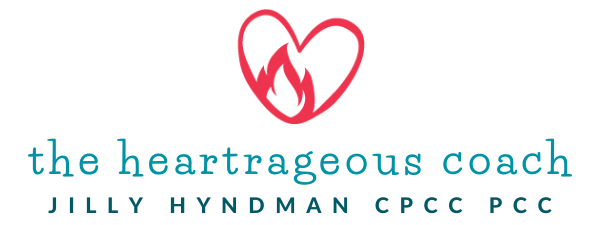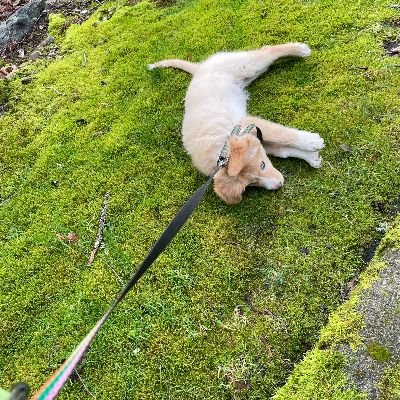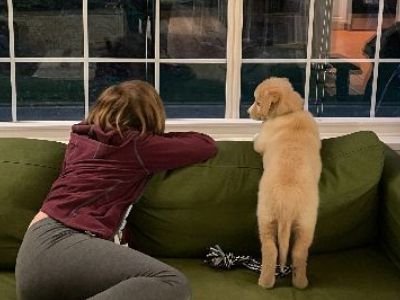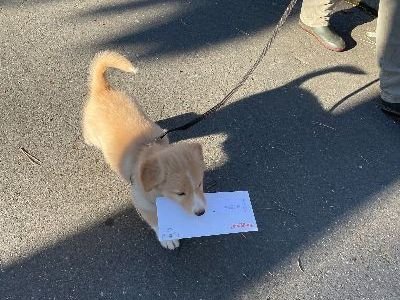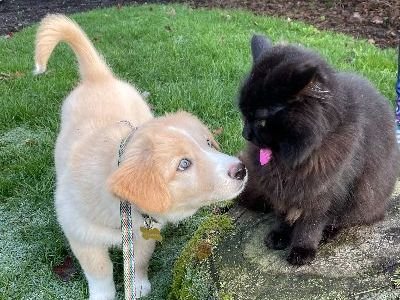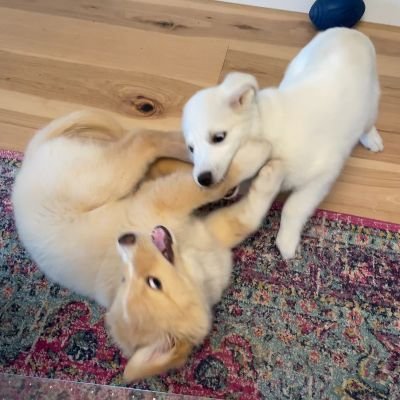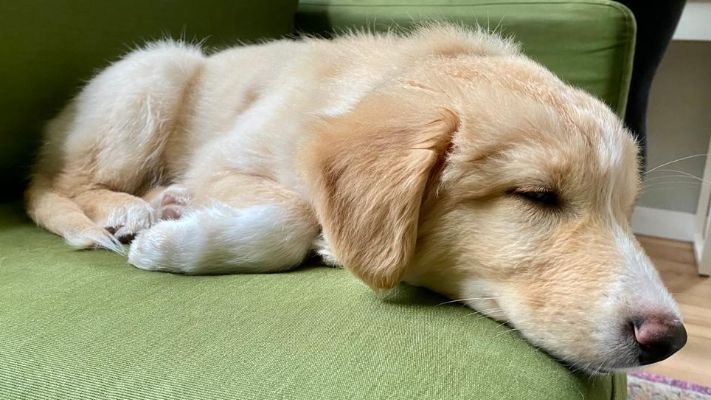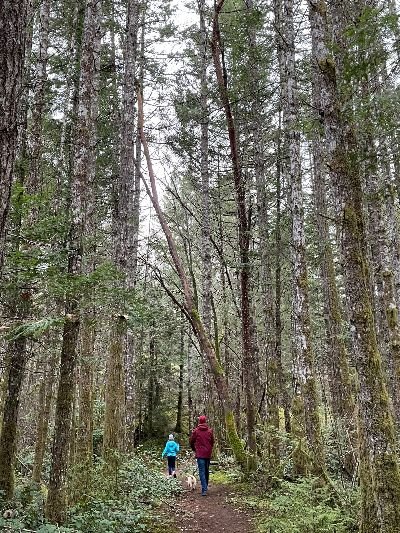Exhale, Inhale: A Love Letter to the Forest, and My Client
Walking in the forest is part of my daily routine. Part movement, part meditation, fresh air, solitude and dog bonding time. Renewal. Inspiration. Exhale. Inhale.
Today I followed a favourite trail and the afternoon sunlight was just so…dappling through the cedar lace and emerging leaves and dancing off the running creek, hurrying yesterday’s rain toward the ocean. Suzanne was bounding and darting alongside, and I was suddenly overcome with emotion.
I stopped and stepped off the path, into a grove of wise trees, recalling a session I had with a client earlier in the day. This client is facing truths and resulting choices that are unfair, too big and too soon for this point in their life.
Our time together was heavy and raw. It left an imprint in my heart.
I didn’t realize how much heaviness was still swirling within. As my legs had scaled the rocky trail, the emotion was stirred up, and it suddenly came out my eyes. I leaned on a sturdy tree and looked upward to the high canopy.
I breathed out sorrow for this client.
Breathed out the unfairness.
Breathed out grief for a life upturned, redirected and cut short, for hopes and dreams that won’t be realized.
Breathed out frustration at my lack of being able to fix or do more than witness and offer questions to contemplate.
I let the trees, through their long limbs and fresh leaves, their trunks covered in soft mosses, absorb my breath carrying all this despair.
And I breathed in the cleansed forest air, full of spring hopefulness for this client to find reasons to live through another day, even though the living is hard, so very hard.
I breathed in the scents of new life, and wished it toward this client for their healing and comfort.
I breathed in the rich, earthy, damp fragrance of the forest floor and willed it to hold my client and provide nutrients for their struggle.
I breathed in. I breathed out.
Then I stepped back onto the trail and onward.
Closing Out the Calendar Year
Hard to believe we are in the dwindling days of 2021. The cooler weather, shorter days and festive lights glowing at night make me want to snuggle up with a good movie or book and indulge in some holiday treats. There may be a box of chocolates in our pantry that’s getting emptier and emptier by the day…
Our household has been buzzing with activity. We had a visit from my parents for 10 days - the first time we’ve been together in two years. We’re in the midst of holiday concerts and recitals, December birthday parties and preparing to host a student over the winter break. Oh, and preparing to enjoy some time off off work and school, too.
Like September, with its upswing in schedules and activities (especially if you have school-aged kids), and June, with it’s finishing-up-before-summer-energy, December seems to be a month of cramming it in. Over the years, I’ve chosen to do less in December in terms of holiday celebrations and extravagance, and still, the time seems to be full.
I closed out another round of Mortal Motivation this week, which has been so deeply delightful. My time on the local ICF Chapter board is coming to a close with our AGM this weekend. I’ve begun mentoring new coaches who are applying for their professional credentials, and continuing to work with several brilliant clients. And, I’ve been active in my community, helping rally our neighbours to influence development choices in our neighbourhood. It’s a lot. All good, but a lot!
So, I’m calling in more spaciousness for the remainder of the month…for me, and for you!
Announcing: New offerings for January
The Stoke Sessions
These three efficient coaching sessions in January get you stoked for your next best year! This coaching package is great for those of you who want to get in and get out and get going into 2022 quickly.
We’ll review 2021, envision 2022 and build an actionable plan to launch you into your new year. We’ll spend 30 minutes together during each call, and you’ll complete some prep and integration work between sessions to get the most out of this focused experience. And, you get three check-ins with me after as you implement your plan!
I offer a sliding scale for this package, with low-, mid- and top-range options. There are only 5 packages left, so if this calls you, let me know asap. (Hint: Makes a great gift, too!)
You can learn more at https://www.jillyhyndman.com/greatstuff/stoke-sessions
Embering
There's an instinctual longing to shift from the activity of Summer and the busy routine of Autumn to the season of slowing down, turning inward, getting cozy and finding stillness within.
Our bodies, minds and spirits are eager for the slower, quieter energy of Winter.
This dark and cold time of year in the Northern Hemisphere provides the perfect energy for introspection. For gathering our energetic resources, enjoying the bounty of harvests and finding quiet. For resting, replenishing and preparing for the the light to return.
Embering is a three-month/10-week self-guided or coach-supported experience to take full advantage of the season of Winter, designed to enable deep rest, quiet and renewal in your whole being, so that you can emerge refreshed, replenished and ready when the planet tilts again toward the light of Spring.
What is “embering”?
It’s a made-up word I’ve defined as:
to preserve and restore one's energy through deep rest, quiet contemplation and stillness, without unnecessary distraction
to take an intentional pause for the purpose of conserving energy for a time
to sustain a fire at a low level so as not to extinguish it; to keep a fire smouldering
Are you longing for a whole-being rest before the new energy of Spring bursts forth? Learn more about the experience at https://www.jillyhyndman.com/embering
There are options for moving through the program on your own (self-guided) or meeting regularly with me (coach-supported), and sliding scale options for both.
Imagine being held by the warmth of glowing embers, in the darkness of Winter, with permission for quiet, rest and to be still. Doesn’t that sound lovely right about now? I know it’s what I’m longing for during the Winter months. I’d love to have you join me around the fire.
Still looking for the perfect gift?
How about a Positively Chronic book or card deck for the special someone?
The book (soft cover, 5 by 8 inches, 124 pages) and the deck (90 full-colour 3-inch by 3-inch cards, a 10-page instructional guide and cloth pouch) contain 90 prompts under six themes to help shift your mood, change your perspective, soothe your body, and express your emotions when you’re having a tough time...with your chronic illness, or anything else!
The book is $27 CAD and the decks are $40 CAD (shipping and handling included). I’m offering a bundle option, too -- get both for $65 CAD (save a couple bucks on the s&h). And, with every purchase, you get access to my Soothe and Uplift playlists!
I’d love to get these into the hands of folks who could really use them…they don’t help anyone sitting in my office!
All the details are at https://www.jillyhyndman.com/pc-book-and-deck
And, be sure to follow me on IG and Facebook to get tips on using the prompts!
Looking ahead to the rest of 2022
I’ll be collaborating on some exciting projects next year.
Positively Chronic Support Group
I’ve been asked to continue supporting a community volunteer group by sharing tools, tips and practices to live well with chronic conditions. It’s been a lovely partnership in 2021, and I’m excited to see how we’ll evolve it for next year.
Spiral Leadership
I’ve been supporting Spiral this year with administrative and coaching support for the most recent Activating the Spiral course, and next September, I’ll be co-leading the Harvesting Together retreat, which is coming to Canada for the first time. If you want to spend some delicious time in the Okanagan in September, check it out!
If you want a taste of Spiral sooner, there’s a retreat focused on Attunement in the Heart of Winter on Lopez Island, WA in February, as well. Reach out if you have any questions. I’d love to welcome you to our growing and impactful Spiral community!
Deathwalker Creations
For the past several months, I’ve been collaborating with two other local deathwalkers (folks who work in the realm of death, dying, grief and loss) to create a perpetual calendar (one that you re-use year after year) to capture deathivesaries, or deathdays, of loved ones.
Our goal is to help folks normalize death conversations, remembering our loved ones and remove stigma around death, dying and grief, no matter the cause.
It’s been a moving experience to pull all the pieces together, to honour our own process and relationships with death and dying, and to find the right tone for the work. We’ve been lucky to engage local (amazing!) artist Iris L. Moore to feature her gorgeous and evocative art.
We’re in the final design stages, and hope to have the calendars ready for sale in early 2022. Let me know if you want to be put on the notice list!
Up With Women
And finally, I’ve joined the roster of professional coaches with Up With Women. This organization is “on a mission to help recently homeless and at-risk women build a sustainable pathway out of poverty,” and I’m honoured to soon be matched with a client for a year-long coaching relationship. I encourage you to learn more about this wonderful charity, and if you are so called, contribute financially or with your time, or refer a woman who may benefit from its work.
Happily, I continue to provide professional coaching to clients through the Humanitarian Coaching Network, as well. These two opportunities allow me to give back with my professional skills and fulfill my value of levelling the playing field for all.
As we close out this cycle of the planet around the sun, I wish you warmth, comfort, connection and good health. I hope you enjoy some quiet and/or connection time, time for reflection on the gifts in your life, and that you offer grace and generosity to others who may need it at this time.
Thank you for your support over the past year, and I look forward to what 2022 brings for all of us.
May you be in good company.
May you have ease.
May you have joy.
Take good care,
Jilly
Updated Puppy Wisdom - Day 10
Day 10: Fresh Eyes
Puppies see the world through fresh eyes, and if we pay attention, we get to see the world anew, too. What a gift to rediscover what's become invisible, or faded into a backdrop, taken for granted, and experience slowing down, noticing and true presence.
At least this is what I tell myself as I wait for Suzanne to thoroughly examine a leaf or stage a silent, go-limp protest to walking when I'm trying to get back to the house for a client call.
As annoying as it is when I need to BE somewhere at a certain time, there really is a gift in seeing the world through the eyes (and nose) of a puppy.
I developed a crick in my neck the first couple weeks of walking Suzanne, partly because I had to think like a puppy before the puppy thought like a puppy and identify dangerous and/or gross treasures on the path ahead so she wouldn't gobble them up. Now that she's better at walking on a leash, and (sometimes) responding to voice commands, we can both relax a bit and enjoy the walk.
The same path we've taken to and from school or the mailbox is suddenly brand new. A shrub with tiny pink flowers that bloom in February has delightful pinecones under it. A field mouse rushes under a bush by the mailbox and Suzanne follows, pulling out layers of birch bark hidden there. The rock formation behind our yard is covered in crispy leave the perfect density for pouncing. The bark of a tall tree in the forest is layered in lichen and moss and decay that looks like a face.
She stops cold when the ravens caw from the tree tops across the street, or when big trucks or buses or bikes approach on the road. She tentatively inches toward Ripley the cat on the way to school, then boldly sniffs her tail. Her body freezes after she follows a big dog into the ocean water at the beach, before her feet find land again.
Everything is new to Suzanne, and through her, to us too. Her fresh eyes have no preconceived notions about a thing. She has to determine, through discovery, observation and testing, if a thing is safe, tasty, friendly, scary, crunchy, wet, cold, sticky. Her capacity to observe is inspiring, along with her ability to log away information. Ivy leaves collect rain water that's fun to lick. Rose bush branches are pokey. Doors open by sliding AND swinging. The sound of crinkling plastic means there's cheese nearby.
There's a big world out there, and maybe someday we'll all get to explore it more freely (again). In the meantime, there's lots to see with fresh eyes in your own community, neighbourhood, yard or home.
The Rest of Our Lives
So, what lessons can be applied to the rest of our lives, whether or not we have a puppy in our homes? Here are some questions that may help you consider how and where you might choose to have fresh eyes.
Our Households and Families
What aspect of your family or household dynamic could benefit from fresh eyes?
What new perspective could you hold for your family?
Our Businesses and Workplaces
What processes, practices, or lines of business could use a fresh eyes approach?
How can you encourage fresh eyes as a regular business practice?
Ourselves
What aspects of yourself -- your view of yourself, a challenge or the world -- could benefit from fresh eyes?
Where in your circle could you apply your fresh eyes to benefit someone else?
What else?
Where else are you seeing a need for fresh eyes? Share your thoughts with me by replying, or posting on my social channels. Let’s keep this conversation going.
The bottom line: We can always choose to look at life with fresh eyes.
Puppy Update:
As Suzanne has explored her world and grown over the past 11 months, our perspective has been influenced, too. While she learns about new things — wasps (spicy sky raisins = bad), fireworks (doesn’t even notice them) or delivery people (do they have treats for me?) we also get to pause and notice things we may take for granted, be unphased by or delighted in. When I’m walking her, we stop often for her to sniff, to listen, to look. I try to do the same and sit in the wonder of our street, our neighbourhood, our planet. I hope I always have fresh eyes.
Updated Puppy Wisdom - Day 9
Day 9: Play
Play is an important part of a puppy's life. And yours. How are you playing lately?
Play: to engage in activity for enjoyment and recreation rather than a serious or practical purpose.
We can all picture puppies playing: running, tumbling, pouncing, yelping, tussling, panting. It's physical, spontaneous and fun to watch.
Play is an important part of their development -- it teaches them how to interact with people, other dogs (and other animals) and the world around them. It's the same with human babies and toddlers: it's how we learn to explore and discover and try things out to see how they work. It's how we learn to fail and try again.
And for humans and dogs, it's how we tire ourselves out (in a healthy way).
The cool thing about puppies is they can turn ANYTHING into play. A stinky sock. A dish towel hanging on the oven handle. That pinecone they found on the ground during a walk. Your pants when you walk by. Their own tail. Learning what's appropriate play and not appropriate is part of the learning.
Something I particularly love about dogs is how open they are to play when they meet other dogs, even dogs they've just met. There's the initial checking each other out -- the sniffing, the tentative leaning in, the circling -- and then the invitation: bum and tail up, front legs splayed, and a short yip signalling go time. And they just know how to do it.
It's something humans seem to lose as we age: the ability to engage in play, both with others, and with ourselves. And yet, it's so critical to our well-being. Especially in the times we're in, when we're being vigilant about our health, and impacted by added stress, financial strain and loads of uncertainty.
It's times like this that play can serve us the most.
Play can open us up to new experiences, new people and new layers of ourselves -- skills, interests, joys we didn't know lived in us. Or, it can simply be an outlet for stress, worry or too much seriousness. It can show us different sides of ourselves, different perspectives and help us learn what serves us and what doesn't serve us.
So consider this your invitation to examine your relationship with play -- the act of doing something enjoyable for no practical purpose. And let the puppies inspire you, if you don't know where to start.
The Rest of Our Lives
So, what lessons can be applied to the rest of our lives, whether or not we have a puppy in our homes? Here are some questions that may help you consider the role of play in your life.
Our Households and Families
What does your household or family do just for fun?
How could you create more time for play in your household?
How could you incorporate play into mundane chores?
Our Businesses and Workplaces
What role can 'play' play in your business or workplace?
How might you encourage playfulness in that setting, and what could the results of play be?
Ourselves
What gets in the way of playing? How could you prioritize play, everyday?
Where and how do you allow play in your life?
What new ways could you invite in playfulness?
What else?
Where else are you seeing a need for more more or different or better play? Share your thoughts with me by replying, or posting on my social channels. Let’s keep this conversation going.
The bottom line: Play is what makes life enjoyable, so do it.
Puppy Update:
As I read this post again, it’s another good reminder for me to engage more in play. I seem to forget it. I’m someone who takes great pleasure from work, at least the kind of work I do! Something that’s emerged in our household is that as individuals, we value or are drawn to different kinds of play. I’m a solitary type. My spouse is a more social type. Our kid is a mix. (Go figure!) Negotiating our shared need for play (and the resulting connection) and our individual preferences is an ongoing conversation. It’s led us to both branch out and engage with others, and claim our alone time with more understanding that a choice for ourselves is not a strike against the other.
Updated Puppy Wisdom - Day 8
Day 8: Structural Comfort
Routines. Schedules. Rituals. Rhythms. Structures.
These all create comfort in a puppy's life, and in our lives, too.
Puppies need routine. It's how they learn how your household works. It's what gives them a sense of security. When life is predictable, they feel safe.
And it doesn't take them long to figure out the rhythms of your day...and let you know when you've strayed!
For a puppy, there are micro rhythms and macro rhythms they learn that help them feel confident and secure. A macro rhythm (or routine) is the shape of their typical day: wake up, go outside to toilet, eat breakfast, play, go for a walk, nap, walk, play, nap, play, eat dinner, meet up with other dogs for more walk/play, go outside to toilet, bed.
Dogs learn quickly when you leave for work (if you do), and when you return, despite being unable to read the clock. The dogs in our dog walking group all know when it's time to meet up, and they let us dog parents know if we're running late!
A micro routine is how a dog learns to follow basic commands or develop good manners. It may include the steps involved in learning to sit, or stay, or cross a street. The micro routines give a puppy a job to do, a focus for a few minutes, and are repeated until they are ingrained and then (hopefully) happen automatically during the macro routine of a day.
For example, when our daughter and I walk to school each morning, we have a micro routine of getting to the entrance of our home, putting on Suzanne's harness and walking a particular route through our neighbourhood. There's a favourite pee spot and a favourite poop spot along the way (for Suzanne, just to be clear). At the corner, we get Suzanne to sit before crossing the street. She then sits and waits for the crossing guard to come to the sidewalk and give her a treat. This process is now ingrained to the point that if we leave the house at another time during the day and take the same path, she strains and whines to get to the intersection...even though the crossing guard isn't there at that time and there's no treat waiting for her.
It's the same reason we humans like routines and schedules: they bring us comfort and certainty in an uncomfortable and uncertain world. But our relationships to structure can vary greatly.
Some people require a lot of structure to feel safe, secure, productive and happy: a calendar with notations for each hour (or minute) of the day; a weekly plan for meals, laundry, sex; vacations planned years in advance; detailed financial plans for retirement forecasting. Cool. Having a plan can feel like control, and control can make us feel good, relaxed and well, in control.
Other folks need less structure and live a more fluid, less-planned-in-advance life. Maybe they catch their favourite show once a week (if they remember); eat when they are hungry and not at regular times; follow urges for how to spend the hours of their day; do what feels good in the moment, rather than what's dictated by a clock or calendar. Cool. Having a spontaneous approach can make us feel good, relaxed and well, in control.
And in times of stress, we can either fervently cling to structures, seeking comfort and certainty in them...or completely throw them out the window, feeling stifled and encumbered. It's interesting to notice how we respond when we feel too constrained, or not constrained enough.
Where we humans can take our routines "next level" is by creating meaning around them. This is where ritual comes in. Rituals give a regular occurrence meaning, and can deepen the comfort the routine provides. Consider family gatherings for holidays, remembrances of loved ones, even a before-bed ritual or making a cup of tea in the afternoon. When we infuse these practices with sacredness, with meaning, they can bring soothing comfort to our lives.
The Rest of Our Lives
So, what lessons can be applied to the rest of our lives, whether or not we have a puppy in our homes? Here are some questions that may help you consider the role of comforting structures in your life.
Our Households and Families
What rituals bring comfort and meaning to your household members?
What rituals or routines might create more certainty and ease in your household?
Which routines or structures might create too much rigidity or confinement?
Our Businesses and Workplaces
How might implementing schedules, routines, repeatable processes help your business or team?
What rituals might be appropriate for a workplace to bring comfort during uncertainty or times of stress?
When do you notice team members or yourself embracing or resisting structure?
Ourselves
What structures currently support you?
What new structures, rituals or routines might bring greater comfort, ease or clarity to your life?
What structures are you clinging to that no longer serve you? How can you let them go or redesign them?
What else?
Where else are you seeing a need for more, less or different comforting structures? Share your thoughts with me by replying, or posting on my social channels. Let’s keep this conversation going.
The bottom line: Structures -- rituals, routines, schedules -- create comfort and certainty in our otherwise uncertain lives.
Puppy Update:
Routines have become fairly ingrained in our household again since the school year began in September. Summer was a bit more flexible, and weekends continue to have a more spontaneous flow than Monday to Friday. We’ve noticed a change in our desire for certain structures since the days have gotten shorter, and the clocks changed a couple weeks ago, so we may be naturally shifting into wintery routines for the next few months. Suzanne still expects a nightly post-dinner play at the park with her friends, and has become quite vocal when we dawdle!
Updated Puppy Wisdom - Day 7
Day 7: Trust is Everything
With a new puppy, just like being on poop patrol, trust-building is a full-time job.
And, like most relationships, it is foundational to everything. (Trust, that is; not poop patrol.)
There's a 3-3-3 guideline provided by the rescue through which we adopted Suzanne: It takes 3 day to decompress; 3 weeks to learn our routine; and 3 months to feel comfortable as part of our pack/household.
The biggest job we have as new puppy family is to build trust with our new addition. She needs to learn that we will tend to her basic needs, not harm her, keep her safe and stimulate her mind. She needs to learn how our household works, what's on and off limits, and how to behave out in public. It can be the difference between life and death: being under voice control and safe, or chasing a squirrel into traffic; sticking by our side or being mauled by a bigger dog; being well-adjusted or fearful and aggressive.
Ever moved to a new community or country, or started a new school or job? Remember that feeling of being untethered, unsure, unsupported? Now imagine not speaking the language, sleeping in a strange bed in a strange room in a strange house with strange people, eating strange food, and not knowing if you'll see your family again or how long it will last. That's the first few days of being an adopted puppy.
It's when dogs (and people) don't feel trust that they shift into survival mode: the world feels big and strange and scary and unsafe and so they make choices that reflect that worldview. When a puppy trusts their new family, they can live joyfully, and simply BE puppies.
Puppies (and people) also need to learn to trust themselves. This is where people tend to get hung up a lot more than dogs! Suzanne seems to be on a good track toward self-trust. There's a visible confidence in her when she tried to jump onto our sofa, even after she failed, like, 30 times before getting it.
It's the same with other physical feats: leaping from a wet log across a small creek to the bank on the other side, tackling our staircases -- first going up, then coming down, until she could do it without hesitation at either end, and tentatively approaching a big dog, having a few sniffs, then assuming the play pose and barking at the dog if it isn't reciprocating.
We can see her trust in us and in herself in the way she leaps willingly into the car for an adventure -- a stark contrast to the first few rides with screeches, whimpers and whines. And when she ambles into her kennel and lays down for a nap or to sleep for the night, rather than hiding under the sofa or wailing to be let out. And we can especially see it when one of us comes home and she greets us...like she's glad to see us and she might actually like us.
We've worked hard to be consistent with her, to explain what we're doing and why, to model how to manage our energy and behaviour for each situation. By stating our intentions, they become real and clear and transparent to us AND to her. We're trying to ensure our behaviour matches our words, so even if she doesn't understand the sounds we're making, she can sense the intention. And that creates trust.
The Rest of Our Lives
So, what lessons can be applied to the rest of our lives, whether or not we have a puppy in our homes? Here are some questions that may help you consider the level of trust in your life, and where it may need to be strengthened.
Our Households and Families
How have you created trust in your household?
Where has trust been upheld or broken in your household?
How might you strengthen trust within your household, so all members feel safe, acknowledged and able to fully express themselves, without fear of retribution?
Our Businesses and Workplaces
What role does trust play in your business or workplace?
Why do you customers or team members trust you? How do you know?
How could you create more or stronger trust between your team or customers and yourself?
Ourselves
In what ways do you have complete trust in yourself -- you ability, your capacity, your strength?
When have you broken trust with yourself? How might you forgive yourself for that and rebuild trust in yourself?
What else?
Where else are you seeing a need for restored, repaired or strengthened trust? Share your thoughts with me by replying, or posting on my social channels. Let’s keep this conversation going.
The bottom line: Trust is foundational to everything.
Puppy Update:
I’m happy to report that Suzanne seems to have settled in and trusts us implicitly. Except maybe when we head to the bathtub with her…
